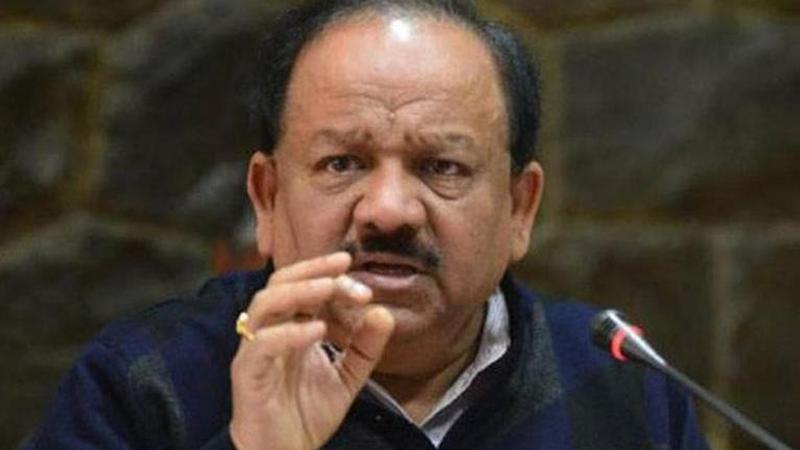Published 18:06 IST, October 18th 2020
Harsh Vardhan says Kerala paying price for 'gross negligence' during Onam
The minister said this ought to serve as a good lesson for all the state governments that were being negligent in planning for the festival season.

With Kerala witnessing a spike in coronavirus infections recently, Union Health Minister Harsh Vardhan on Sunday said the state was paying the "price for gross negligence" during Onam festivities when unlocking of services along with an increase in travel for trade and tourism led to the spread of COVID-19.
The minister said this ought to serve as a good lesson for all the state governments that were being negligent in planning for the festival season.
Kerala's COVID-19 tally has crossed 3.3 lakh while the toll climbed to 1,139 on Saturday. Prior to Onam (August 22), the state had reported around 54,000 cases, while the death toll was nearly 200.
During an interaction with his social media followers on the sixth episode 'Sunday Samvaad', Vardhan reiterated his request to everyone to celebrate festivals at home with their loved ones in the traditional way to ward off the risk of COVID-19 infection.
“This festive season, charity must take precedence over celebrations.
"My own celebrations too shall remain subdued due to the heart-rending impact of COVID-19 on lakhs of corona warriors across the world battling for us," the minister stated.
He also assured that there is no shortage of medical oxygen in the country and that government is ready to scale up the production capacity to meet any further increase in demand arising due to the pandemic.
Responding to a question on Kerala recently reporting a spike in COVID-19 cases, Vardhan said that between January 30 and May 3, the state had reported just 499 cases and two deaths due to the disease.
He regretted that "Kerala was paying the price of gross negligence" during the recent Onam festivities when state-wise unlocking of services along with an increase in inter and intrastate travel for trade and tourism led to the spread of COVID-19 across various districts.
“The epi curve of Kerala changed completely due to Onam festivities across the state. The daily new cases nearly doubled," Vardhan said.
He exhorted the people to honour the prime minister's call for a 'Jan Andolan' (mass movement) to religiously follow COVID-appropriate behaviour.
Vardhan also said that as of yet, no mutation of coronavirus has been detected in India that is either more transmission efficient or more pathogenic.
Answering a question on the discrepancy in the COVID-19 death figures, Vardhan said that the Ministry of Health has taken up the issue of correct certification of COVID-19 deaths with all states and UTs on multiple instances.
It has also shared a proper modality of reporting of deaths with them to ensure consistency in reporting of COVID-19 related deaths across India, the minister said.
Replying to a query, Vardhan said that community transmission of COVID-19 is limited to certain districts in a limited number of states.
In different pockets across various states, including West Bengal, community transmission of COVID-19 is expected to occur especially in the densely-populated areas, he said.
"However, this is not happening across the country. Community transmission is limited to certain districts, occurring in a limited number of states," Vardhan said.
The minister was responding after a participant while citing West Bengal Chief Minister Mamata Banerjee's remark that there are instances of community transmission in her state asked which states have seen community transmission.
Vardhan rekindled the joy of having morning tea with the daily newspaper in a respondent by reassuring him that there is no scientific evidence that proves that novel coronavirus transmission can happen via newspapers.
"Reading newspapers is completely safe even during the COVID-19 pandemic," he said.
On the availability of medical oxygen in the country, he said the current oxygen production capacity of India is around 6400 MT/Day.
The government is ready to scale up the production capacity to meet any further increase in demand arising due to the pandemic, he said.
The 'Empowered Group' constituted by the home ministry is monitoring the requirement of medical oxygen across India.
The health ministry is also monitoring the availability and supply of medical oxygen at the field level through regular video conferencing with state nodal officers as well as with principal secretaries or mission directors.
He said 1,02,400 medical oxygen cylinders had been delivered to states and UTs.
The National Pharmaceutical Pricing Authority has fixed the price of Liquid Medical Oxygen. Guidelines on 'Rational use of oxygen for management of COVID-19' have also been issued, he informed.
Vardhan remarked that although there are no intranasal COVID-19 vaccines under trial in India at the moment, Serum Institute of India and Bharat Biotech are expected to pursue clinical trials of such vaccines in the country in the coming months on receipt of regulatory approval.
On China's claim that the novel coronavirus broke out simultaneously in several countries last year, Vardhan said, “There is no evidence that can validate the claims on global multiple focal points for the novel coronavirus outbreak.” Therefore, the reported outbreak of COVID-19 from Wuhan in China remains recognised as the first report worldwide, the minister said.
In a follow-up to a question from the last episode, Vardhan was asked on phase 2 of the COVID-19 grants to states, to which he said Rs 1,352 crore have already been released as part of the second COVID Package to 33 states and UTs.
This phase 2 grant has been released in trenches during August, September and October this year, he said.
Sharing details on the special Drive for Adverse Drug Reaction (ADR) reporting and monitoring of drugs used in COVID-19, Vardhan clarified it is not because of an adverse reaction reported with an existing drug but is part of a proactive COVID-19 preparedness programme.
Updated 18:06 IST, October 18th 2020




